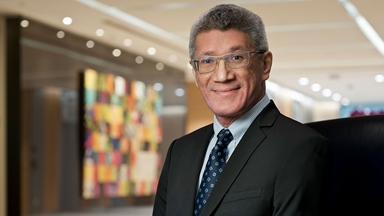Loading component...
At a glance
In 1989, Deloitte became the first employer for Pui Yuen Cheung FCPA, who readily admits that the accounting giant will also likely be his last.
In a career that has spanned more than three decades of accounting experience, Cheung has risen through the ranks to become the organisation’s chief executive officer in Singapore, and has been afforded enough varied opportunities that he has simply never felt the need to move on.
“The work has always been very interesting, with different ways of doing things and challenges,” Cheung says.
“There are a lot of opportunities – you can travel and do different work and be based at different offices. It is one of the advantages of being in a big company.”
Cheung took up the CEO role in January 2019, an interesting time for businesses in Singapore, amid bubbling international trade tensions and the Belt and Road Initiative gaining traction in the region.
Soon, the challenges posed by the COVID-19 pandemic were also forcing businesses to adapt and innovate at a rapid pace.
People power
On a personal level, Cheung, who used to travel for business all around South-East Asia on a monthly basis, was suddenly managing about 2900 employees remotely from his home office, while also working with external clients and maintaining compliance in a shifting regulatory landscape.
His focus on his people, he says, became razor-sharp.
“Talent is our major resource, and we have to deal with it properly – be empathetic to others’ needs and see what they are concerned about. Lately, we have focused a lot on mental health. We have spent quite a lot of energy and time on this, so our staff can be mentally prepared for the COVID-19 situation.”
Like many countries, Singapore is learning to live with COVID-19, and Cheung concedes that work will never be the same again.
“What we have learned over the past one and a half years is that using a hybrid model of working at home and in the office actually can work,” he says. “There’s a lot of efficiencies to be gained... but I also believe, personally, that it is important to have face-to-face meetings, to interact, to brainstorm where possible. I don’t think we’ll go 100 per cent remote or 100 per cent back in the office.”
Seizing opportunity
Cheung’s first role with Deloitte, 32 years ago, was something of a roll of the dice. At the time, the company employed just 150 people in Singapore, fewer than the number of partners it has in the country today.
Alerted by one of his lecturers at the National University of Singapore that the company, then known as Touche Ross, was on the lookout for new graduates, Cheung was intrigued. His mind was made up when he learned that also on offer was a secondment to Australia and the opportunity to earn a professional accounting qualification.
“I think it was a great opportunity that doesn’t come along every day for an undergraduate,” he says. “It was a different experience, working in Australia. There were some new things, but the people were friendly, the working style was easy to adapt to, and the language wasn’t a problem for us, so it was quite easy to get used to.”
Working on large audits in an already well-established market gave Cheung the perfect grounding to drive his career back in Singapore. He spent time in the statutory and financial audit areas, before taking a nine-month break to complete his master’s degree at the University of Cambridge in the UK.
From there, he progressed to become an audit and assurance partner and, over the next 16 years, worked his way up to the role of deputy managing partner for operations in Singapore, advising companies on their initial public offerings and conducting audit-related seminars along the way.
Clear communication
Working across countries in the region, Cheung has often found goal setting to be a challenge. To resolve this, he says, communicating goals clearly is key.
“At one stage, I was the South-East Asia audit leader, and one of the big challenges was to get all the offices in South-East Asia to the same level of competence and capabilities, and to address concerns over new ways of doing things and different cultures,” he says.
“We’re on the same wavelength now, but at the start there were some differences, and I had to convince everybody to come along for the ride. It was a challenge in terms of difficulty, it was a challenge in terms of understanding.”
There have also been broader lessons on leadership, particularly from what Cheung has observed with start-ups, where he sometimes feels there is a mentality that every battle must be won.
“Of course, when an organisation is small, you can win often, but when you get to a certain size, you can’t,” he says. “If a leader continues to have that attitude, they’ll have no people working for them. I’ve come across cases like this, where the company stagnates because the best people just won’t stay.”

